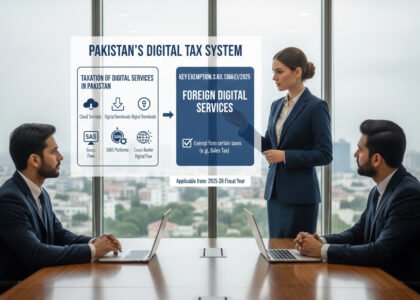The Finance Act 2025 has added major new compliance requirements under Section 181 of the Income Tax Ordinance, 2001, targeting the growing e-commerce sector in Pakistan. The amendment requires all online sellers using marketplaces or courier services to be registered under the Ordinance, failing which they will be restricted from transacting through those platforms.
This move is part of a broader tax net expansion strategy, integrating digital commerce with tax compliance infrastructure.
Text of the Amendment
Clause (a) – Amendment in Sub-Section (1)
The following words are inserted after “taxpayer”:
“…including a person selling digitally ordered goods or services from within Pakistan using online marketplace or a courier service, as the case may be…”
Clause (b) – New Sub-Section (1A) Inserted
“(1A) Every online marketplace or courier service, involved in e-commerce by supplying or delivering digitally ordered goods or services from within Pakistan, shall not allow any vendor to use its platform services to carry out e-commerce transactions unless such vendors have been registered under this Ordinance.”*
Legal Interpretation of the Amendment
Who Is Covered?
The amendment targets:
Online sellers using platforms like Daraz, Foodpanda, or other local e-commerce platforms
Home-based vendors, freelancers, and small businesses supplying goods/services digitally
Courier-integrated sales models (e.g., selling on social media using delivery apps)
Example: A bakery in Lahore selling cakes via Instagram using a courier must now register under the Ordinance to legally continue such transactions.
Platform-Level Restrictions on Unregistered Vendors
The onus of enforcement is now shared with:
Online marketplaces (e.g., Daraz, OLX, TikTok Shop, etc.)
Courier services (e.g., TCS, Leopards, Call Courier)
They are legally barred from onboarding or serving unregistered vendors. Non-compliance may expose platforms to regulatory scrutiny and penalties.
Purpose and Policy Impact
Widen the tax base by formalizing Pakistan’s digital economy
Ensure traceability of e-commerce transactions
Prevent income concealment in informal online businesses
Integrate courier and marketplace ecosystems into FBR’s registration verification matrix
FAQs – Section 181 Amendments (Finance Act 2025)
What is Section 181 of the Income Tax Ordinance, 2001?
It deals with the registration of taxpayers with the FBR.What is the new requirement for e-commerce vendors?
All sellers supplying digitally ordered goods or services must register under the Ordinance.Who is considered a “vendor”?
Anyone selling goods or services online using a marketplace or courier service from within Pakistan.Are social media sellers also covered?
Yes, if they deliver goods via courier or receive digital orders.What if a vendor is not registered?
Marketplaces and courier companies must deny service to unregistered vendors.What if an unregistered vendor still manages to sell?
It may result in enforcement actions by FBR, including penalties, audits, or blacklisting.Are freelancers included in this provision?
If they are delivering digital services via a platform, yes, they may be subject to registration.Are courier services responsible for verifying vendor registration?
Yes. They must ensure the vendor using their service is FBR registered.How can a vendor get registered?
By obtaining an NTN (National Tax Number) through the IRIS portal of FBR.Will FBR issue notices to non-compliant platforms?
Likely yes. Enforcement actions may begin once implementation rules are finalized.Do these rules apply to international marketplaces like Amazon?
Only if the seller is based in Pakistan and delivering from within the country.Will it impact delivery-only startups?
Yes. Even such businesses need to be tax-registered under this law.Is it effective immediately?
It takes effect from 1st July 2025, subject to further procedural rules by FBR.What documents are needed for registration?
CNIC, mobile number, email, and basic business information.Does it affect vendors in FATA/PATA or tax-exempt zones?
Those zones may have special conditions, but the obligation broadly applies nationwide.Can marketplaces be fined for violations?
Yes, enabling unregistered vendors may result in regulatory penalties.What’s the difference between this and Section 165C?
Section 165C deals with reporting requirements, while Section 181 addresses vendor registration enforcement.Will this increase documentation for small sellers?
Yes, but it also opens doors to formal business benefits and protections.Can the registration be done by tax consultants?
Absolutely. Tax practitioners can assist vendors in completing their registration efficiently.Will there be penalties for delayed registration?
Likely yes. Penalties under Section 182 may apply to non-registered vendors or platforms enabling them.
Disclaimer:
This blog post is intended for informational and educational purposes only and does not constitute legal or tax advice. Readers are advised to consult with a qualified tax advisor or legal expert for personalized guidance. The publisher disclaims any liability for actions taken based on this content.






